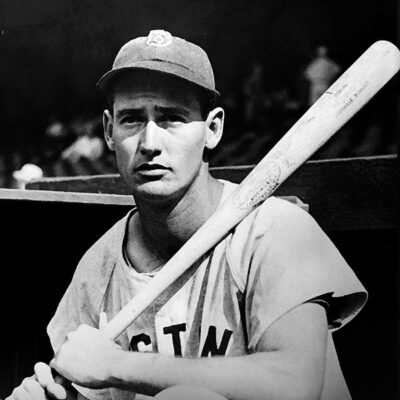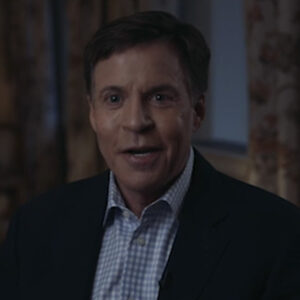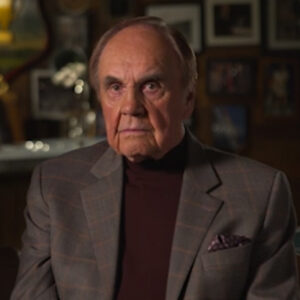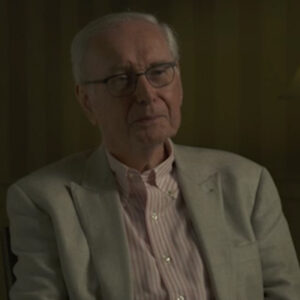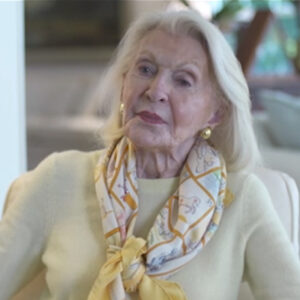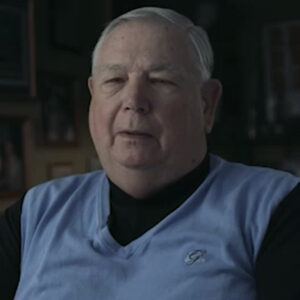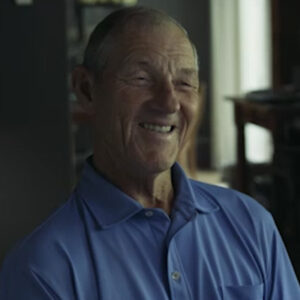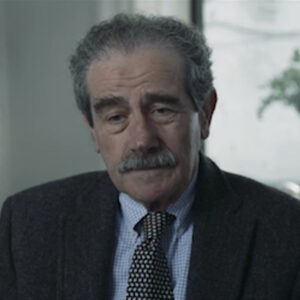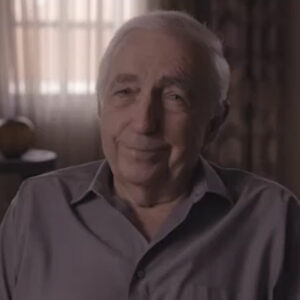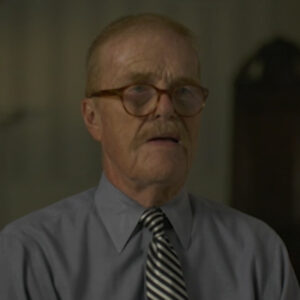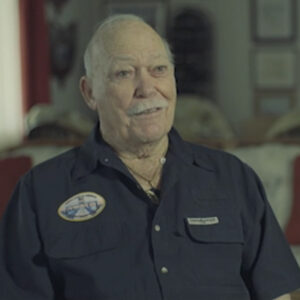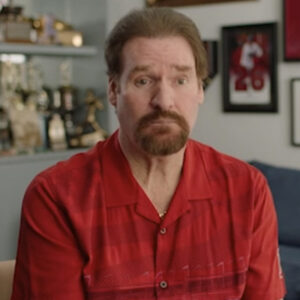Speaker 1 Peter Sutton, I’m a senior partner at Lehman Brothers, the law firm, I’ve been an attorney for over 45 years. I met Ted Williams through his son, John Henry Williams. John Henry Williams had a store at the Atrium Mall in Boston called the Ted Williams Shop. And through John Henry Williams, I became an attorney for Ted and John Henry and the family business, which at that time was selling autographs, basically.
Speaker 2 So was John Henry already a client?
Speaker 1 No, John Henry wasn’t a client at that time.
Speaker 2 So did you know when you got a call from John? Was it John Henry contacted?
Speaker 1 Well, it wasn’t a call. We were at his store and he was very dissatisfied with his current attorney. And we got the talking and he retained me. And actually, he had a fractured ankle and he needed an attorney at that time. And I took over that case and we settled it for him. And I first met Ted very interestingly at John Henry, invited my son into a Nyanda, I believe was about 15 at the time, 14, and they had an apartment on Beacon Street in Brooklyn. So John Henry and his girlfriend at that time, Anita, who was also a Miss Massachusetts Wener, invited me over to the house for dinner. So as soon as Andrew and I walked in, they left. And I was the babysitter for Ted and he first talked to Andrew, he said, do you like baseball? And you said, no, I like football. Ted said, Well, I was a great football player. I was a great football player. And he talked about high school football. Then he asked Andrew if he knew why a ball curved in. Andrew, of course, didn’t know how or why a ball curve. So Ted would take out a piece of paper and he would draw all sorts of angles and say gravity. And I think we saved that little piece of paper and why a ball curves. And then he asked Andrew he’d like to test people, said, Andrew, is your father a heck of know anything about baseball? And Andrew said, he’s an expert. Oh, well, Mr. Expert, I’m going to ask you a question that nobody knows. And if you know what, you’re an expert. My first ball game, I caught a fly ball. Who hit it? I said, Lou Gehrig, nobody ever got that. And so we started talking. We talked politics, but the phone was ringing. They found out that Ted was in town. So the talk show hosts called Ted up and they wanted a story. And Ted told the story was very interesting at the time he had been in an All-Star Game. I can’t remember whether it was Chicago or Cleveland and he injured himself. I don’t remember whether his shoulder or his elbow. He’s in the hospital and two bulk players came to see him and the nurses wouldn’t let him upstairs and they called up, said Mr. Williams. There are some people who want to see you, but we don’t want to send them upstairs. He says, Why not? Well, they call it.
Speaker 3 I don’t care if they’re
Speaker 1 green, send them up here. I believe one was Larry Doby and I forget who the other one was. So, you know, Ted didn’t have a racist bone in his body.
Speaker 2 So getting back to John Henry, he just left you there with Ted. Yes. What was John Henry like as a as a person? We’ve heard a lot of, you know, reports about John Henry taking advantage of, you know what? What was he like? I mean, obviously it’s hard growing up being the son of someone so well-known and so successful.
Speaker 1 Well, it depends on what point in time John Henry Williams was misinterpreted. He had a family business. Ted had around the clock help at that time. He was an old man. He was a stroke victim. If you had the type of glass he needed to pick it up with two hands because he saw it double, so he needed help. He had a manservant, he had a cook, he had 24 hour care, which was very expensive, and people like Antonucci had taken advantage of him and had taken a million dollars from him. They wanted to find in Antonucci and they went to America’s Most Wanted and they found him up in, I believe, Washington State some place trying to cheat some other person. And then they put him in jail. So the family business was autographs, was signing Flatt’s was signing baseballs, were signing parts and going to car shows. And we would set up car shows for Ted. He would make a lot of money for two days just signing. And that was his business. And he had a Ted Williams museum. I think the Timpone have a house farm in Citrus Hills and they had the museum. Ted would go down and sign something. That was the family business. John Henry Williams Jr. jealously guarded that he didn’t want Ted to inundate the market by signing too many things for nothing. He should get paid for it. And so he was a very good son. After Ted’s operation, John Henry would take showers with him, clean him up, would stay with him for nine months. He would clean his toenails. He would take care of them after the surgery. Surgery was very interesting situation. I think it was around 2001. Ted couldn’t sleep. He couldn’t say he had to sit in a chair, he couldn’t lie down, he couldn’t catch his breath and I got a call late at night, the whole family was in Florida and they were deciding what to do. And they called me up and they said, Peter, we have this situation and we’re not sure that the surgery is going to work and Ted might not make it. What do you think? They said, well, what’s the problem? And they told me, they told me the medical problem, they’re all sitting around. I said, well, that anybody asked Head. Silence is to put her on the phone. Ted, how are you feeling? Oh, Pete, I can’t take this anymore. I can’t take a breath, I can’t lie down. I don’t want to live like this. I said, then what do you think? I said, let’s go for it. OK, so Ted made the decision to have the surgery as a result of the surgery. When he got out, he needed more than 24 hour care. And it was John Henry gave up his business, let Anita run it, which was the Ted Williams family enterprises. And he stayed with them for nine months. And then the business pretty much tanked after that. But all the creditors got paid. John Henry Williams never took a drink. He was a health nut, never swore, never said anything bad about anybody. But he would jealously guard. All of the autographs and there were a couple of books read about the autograph forgeries in those days. There was the operation bullpen, the operation foul ball, foul ball, I believe it was with the FBI. John Henry Williams was the instigator of this. And we knew the people who were doing the forgeries. We knew where they were. We would walk into a store in Watertown. And see Ted Williams baseball, which were obvious fakes, and I would ask the man, where did you get this ball? He said, I got it from Ted Williams son. And I turned to John Williams and I’d say, Do you know this guy? No, I never saw this guy. And then the ball would go behind the counter. Then we’d then we’d call the authorities to do a raid and they would find all the sign of them in the back room. But Ted could not identify baseballs because of his vision, so he could not be the one. To bring the action, so we suggested to the federal authorities to use Michael Jordan because he had an exclusive with upper deck on the basketball so it would be easier to show footage, basketball, basketball, because they wouldn’t have the hologram, they wouldn’t have the upper deck stamp. So that’s how the forgeries got started. Everybody reject you know, they resented John Henry Williams. They claimed that he used to sign the balls, which was untrue. Many rumors were spread about him. But, you know, he was a good son.
Speaker 2 The that’s great. One thing he said, I think he said Timpone, isn’t it, the tempo
Speaker 1 tempos are good.
Speaker 2 So if you wouldn’t mind, just tell me again as if we hadn’t already discussed it. Just tell me again about some kids. You know, what was Ted’s business in the 90s and what he knew, what
Speaker 3 he had
Speaker 1 exclusive contracts with Upper Deck to sign certain baseballs for a certain period of time. And I recall after he had his strokes, upper deck wanted to cancel the contract because he couldn’t sign baseballs anymore because they were too difficult. And we pointed out to upper deck that all he had to do was sign the flat baseball cover and then they could put the cover back on the baseball and then they would have their baseballs. And that’s how we resolved that problem. There would be the card shows we had contracts with Fleer, we had contracts with other card companies. And I would you know, I would review the contracts and. We also tried to negotiate a deal, I believe, with I forget his name off the guild, but I think it was there’s a museum in Winchester, but that didn’t work.
Speaker 2 So what was Ted like? I mean, you spent a fair amount of time with him. What was he like?
Speaker 1 I did not spend a fair amount of time with Ted. Ted was down in Florida and I would speak to him occasionally on the telephone. The first thing he would ask me every conversation is, how’s your son? How’s he doing? Is he, you know, pumping iron, is he? That’s the first question I’d ask and then we’d talk a little bit about business. I talked to Ted, I think the most during the All-Star Game. He did not want to come to Boston for the All-Star Game. That was in 1999. He refused and if anybody knows Ted Williams, if he doesn’t want to do something, he’s not going to do it. And that was the big fallacy that people would say that John Henry is making Ted do this or making Ted do that. That was ridiculous. Ted was his own man and he was not coming to the All-Star Game. I would be talking to Dan Duquette. Dan wanted him up in Boston. I don’t want to go to Boston. So they were thinking of ways, so I think Dukat had talked to one of the owners. I think he’s the owner of Tampa Bay at the time he was going to fly Ted up in a private jet. They’re going to put him up at the Four Seasons Hotel. Ted didn’t didn’t want to go. So then I think the kids said they would donate in his name a large donation to the Jimmy Fund if he came up and said, I’ve helped the Jimmy Fund enough. I don’t want to go to Boston. I don’t want to go. Couldn’t get Ted to go. So finally, I said to Ted, you know, somebody just called and if you wore their logo. At the all star game. They would pay you over six figures. And Ted was on the phone and he said, would it help my son’s business if I wore his logo? And I said, yeah, that would be great. I’ll go for my son. So he went to the all star game
Speaker 3 to wear
Speaker 1 that logo, and if you noticed, he had a Saturday, that shirt, he had hit a button, that hat he had it hit a button, that jacket. But he wasn’t wearing it. I’ve showed you the jacket we got into the Four Seasons, my son and daughter. First thing, Ted, what do you have a hat? And he took his hat off. You don’t have a hat. He gave me a hat he had worn that had up at Lord Loudon the day before they had a racecar in that race here. Donnette and Ted was very concerned because the driver was 19 years old and he was very afraid for the young boy driving the car. But he was impressed with that. And he wore you know, he was headed in that jacket. My kids walked in. They had a goody bag with the Ted Williams autographed baseballs hit dot that they all got jackets at a dot net, shirts hit a dot net hat’s hit a dot that Ted was so proud of his son. And so we had a lot of fun and, you know, the Four Seasons and then we we went to the game now,
Speaker 2 although long time and stop, this is great. This is coming to us again. Can you tell me why don’t you think. Yeah, I’m sorry. Yeah. We’re just writing this on your. Why don’t you just go. Yeah, that’s it. Yeah. This is terrific. It’s just great. Really. Yeah. Let’s take one second. We’re going to close it. Is it.
Speaker 1 Is it off.
Speaker 2 It’s of no I’m still
Speaker 3 going to know now and
Speaker 2 I would start you know, obviously if you’re told to drop it, that’s great. Thank you. Yeah. That’s so much
Speaker 3 better.
Speaker 1 And if you ask me that, I’ll say he they they would send him bills for tickets and he didn’t like that.
Speaker 2 So, yeah. Tell me again, we don’t know who Dan Duquette is. So just when you tell him to say it and accept that, you know, who ran the Red Sox at the time or the GM or whatever it was, can you just tell me what why didn’t he want to go to Boston for the 99 All-Star?
Speaker 1 Well, you have to remember, he was a stroke victim and it was very difficult to get around. He was seeing double. He didn’t like crowds. And he also had a problem with the Red Sox at that time, not with Dan Duquette, who was the general manager, but the Herrington’s were running it. And when Ted would go to the ballpark and bring more than one person, he’d get a bill. He never paid it, but he didn’t like getting billed for tickets.
Speaker 2 They would build Ted Williams. Yes.
Speaker 1 That’s crazy, but Internet safety box that we opened up, he had a year, a lifetime pass to all ballparks. It was in bronze. It was metal. And I think we saw that at the auction, but it was very interesting that it put that in a safety box in Boston.
Speaker 2 So what was hit or dot net?
Speaker 1 It was a dial up Internet company, it was people that wanted to use the Internet in Hernando, Florida, and they could dial in, he’s
Speaker 2 going to stop you because we’re not going to hear my questions. You could just say hit or dot net was that,
Speaker 1 you know, hit dot. That was a dial in company to get on the Internet so that you could get computer access. And John Henry Williams took a company. He had a 250000 dollar investment and had a seven million dollar offer, which he turned down. And then later on the bill, he didn’t take it. He should have taken the seven million. He wanted nine million. But at that time, then something happened. The big companies came in and he was out of business, basically, and he did not file bankruptcy. But I think they paid off all the creditors.
Speaker 2 And you mentioned before some of the interesting businesses that John Henry got into with Enron. And are you interested in telling us that
Speaker 3 no
Speaker 2 longer like a spoken like a lawyer? So the the let’s go back before we get into the 99 all star game. There’s a couple of stories you told me before I didn’t want to miss out on. But if you met John Henry, like, what kind of guy was he? Was he a nice man? Like, I just have no sense of what he was like as a person.
Speaker 1 You’d what you’d want to see your daughter bring him home. Is that kind of a very well-mannered, well groomed, very polite individual, good kid.
Speaker 2 Great, great. So the the TED story that you told me before I let it go, you going into the all star game, so he didn’t want to go because he didn’t like the Red Sox management. Finally, what convinced him to go?
Speaker 1 He wanted to go to wear his son’s logo and promote his son’s business. And we explained to him that companies would pay him six figures to wear their logo at the All-Star Game. And he. Didn’t want the money for himself. He wanted to help his son.
Speaker 2 So he went to the game, you went to the game. Can you tell me about that?
Speaker 1 Well, it’s very interesting. Again, one of the reasons he had problems with the Red Sox was that at this particular point, he had an entourage of people that wanted to come and they couldn’t provide seats for everybody. They couldn’t. So he had a friend, John Henry Williams, had a friend, Jerry Rittenberg, I believe he’s with party favors, a party city, and Jerry spraying for the Polaroid box at that time for the two days, the All-Star Game, the old timers game and the homerun hitting contest and the All-Star Game. And he paid for it out of his own pocket. John Henry brought a medical doctor to be there with a defibrillator and some of Ted’s closest friends. And Ted had a great time in the U.S. Marines after they performed, the colors, came out and stood outside the box waiting to give Ted an award. When the game was over and Ted was leaving, they escorted him down, but they gave him an award because Ted had said the best team ever played for was the United States Marines. And it was it was very touching. And he had a great time at the All-Star Game. We invited Matt Damon into the box and he had a great time with Matt Damon and Luke Gorman, who was the general manager at the time. Pride in the flyers. And the four for jet pilots have done a flyby, so he sent the limo for them at Hanscom Field and they came in in their in their flight clothes to meet Ted. They were very impressed. And Ted looked up at one of the men and he said, what was your altitude? And they said, 1500 feet. Good goes. Bullshit, you guys were 750 feet and you set off all the burglar alarms in Roxbury on the cars and they started talking. What’s the thrust of your engine? Oh, my God. My engine only did X number of thrust. That must be fun. And he was talking to these guys like he was an expert on flight and he was learning he was trying to get information from them on how the planes had now been upgraded to what he was flying. He was also proud of the fact my son went to Amherst College and Ted said, I went to Amherst College, I was there during World War Two, and he was very proud, is also proud, very little said about his love for Claudia. And just like John Henry Williams. Wanted, you know, to be with Ted all the time and to, you know, pursue the family business. Claudia was the exact opposite. She didn’t want to capitalize on Ted’s name and she didn’t want Ted writing letters to get her into school. She wanted to do everything herself. Ted respected that so much that she was so independent that she spoke foreign languages that she would ride her bike 30 miles to see him and then ride the bike back. Very impressed with his daughter. He loved his daughter. The problem was he never really told her, as far as I know. You know, he was she was very independent and she is quite brilliant. She’s now a registered nurse at the school, wrote a book, Fantastic Person.
Speaker 2 Yes, she’s really strong. She seems to have inherited his strength with John Henry that way to.
Speaker 1 In what respect?
Speaker 2 Well, when you meet Claudia, you feel like this is a very strong, independent person with her own ideas and John Henry, I just have not been able to get a sense of was he just doing it all out of selfless love for his dad? Was he, you know, even if he’s in it for money for himself, there’s nothing wrong with that. But I don’t I just have not been able to feel I feel ten people tell me stories about did you feel like, oh, wow, I like you’re imitating him. I feel like I’m in the room with Ted. I don’t get that sense with John Henry. I have no idea
Speaker 3 really who he was.
Speaker 1 John Henry Williams was an entrepreneur. John Henry Williams went to college. I played baseball. He had to take over the family business. What was the family business? Ted Williams. Simple as that. Meanwhile, on his own, he set up his own Whitter Internet company. And he was very successful at it. He lost the business pretty much because he was with Ted for nine months, helping Ted recuperate. He loved his father. And he was a good son.
Speaker 2 Great. So at the all star game, when Ted is wearing his hat because you see the footage and he’s wearing the hat and he’s wheeled out, tell me tell me the scene that took place on the field,
Speaker 1 on the field, all of the ball players, after they were introduced, surrounded, Ted, were very happy to meet him and Ted was thrilled. But he was actually very thrilled when he repeated that. I asked Mark McGuire, I guess Mark was in the homerun hitting contest and he said, Mark, did you smell smoke when that ball hit the bat? And he said, yeah, Ted was very proud of that because Ted used to smell smoke when his bad hit the ball.
Speaker 2 Did you did Ted tell you the story about the rookie striking him out? No. OK. What can you tell that story?
Speaker 1 One of the stories that I had heard was Ted was struck out by a rookie pitcher to end the ball game and the rookie pitcher asked the ballplayers and the Red Sox with Mr. Williams signed the ball that I struck him out with. And the ballplayers laughed because they knew Ted hated that. It’s a matter of fact, most of the baseballs that were signed back in the 50s were signed by the equipment manager and he would sign Ted’s name on the sweet spot. And because he was signing these autographs, which is quite different from later on in life. And so the rookie walks into the clubhouse, said, Mr. Williams, will you sign the ball that I strike you out with? And Ted was about to give him a raft of F bombs. And Ted looks around and sees all the ballplayers, you know, laughing ha ha ha. And Ted goes, Give me that son of a bitch. And he signs it next day, same situation, rookie pitcher comes in. Tells him the same pitch that hits the ball over the wall and Ted rounding second base yells out, And if you find that son of a bitch, I’ll sign that one to.
Speaker 2 That’s great. So the I’m jumping around here a little bit, just bear with me. You had mentioned before the Larry Doby story about him and another guy coming to visit him. Do you know about this 66 induction into the Hall of Fame as well?
Speaker 1 Just just but, you know, I’ve heard the speech, but again, my relationship with Ted was not one of hero worship. It was know business, talking about the family, talking about business. Ted had one real problem. I guess this is what really solidified my relationship with Ted Cruz back in. The late 90s, Ted called me up, very distressed, call me directly. A lot of times John said we would open the phone, but Ted called me up and he says, Peter, he says, I can’t sleep at night. I’m bothered. So what is it that I bought an insurance policy? And I paid a 100000 dollar premium, I was told to be a one time premium and it’s a 500000 dollar policy. And I’m getting bills eighteen thousand dollars a year, nineteen thousand dollars a year. That’s not fair. They told me it was a one time premium. I said, Ted, send me the policy. Send me the application. So they sent me the policy and I look at it and I said, and you can see that the policy. In fine print says later on in life with contingencies, the policy might have to give premiums, but that was not what Ted was told. So I asked Ted, was anybody with you when you bought the policy? And he said, well, yeah, well, Cassidy and Cassidy was his very good friend. Al Cassidy’s father ran the Ted Williams camp in Lakeland. And Al was really Junior was really a confidant of Ted. Al would talk to Ted, you know, three, four times a day, basically, as one of the very few people Ted could trust. And so I picked up the phone and I called and I said, well, my name is Peter Sutton. I’m the attorney. I was very suspicious of me because he was very protective of Ted. But he checked me out and he said, yeah, I was there. That’s what they told him. So I sent a letter to the insurance company and I said, you know, we’re not going to pay this, and they were giving me some flak. And finally, I had affidavits from Al, you know, of course, the agent denied it, but he didn’t remember there was another witness in the room, an outcast, and he was one of the most successful developers in South Florida. It would be probably the equivalent of in Massachusetts having Bob Kraft as a witness. You know, like why would somebody of that ilk have to fabricate, you know, they’re totally honest. And so we settle the case. And Ted got didn’t have to pay the premiums and got all this money back that they charged him. And after that, Ted, you know Ted.
Speaker 2 Did you feel also like he had tested you on that first meeting? Oh, absolutely. Tell me that again.
Speaker 1 He had asked me he asked my son if I know anything about baseball. And my son Andrew said, yeah, my dad’s an expert. And he said, Well, Mr. Expert, I’m going to ask you a question. If you do if you know the answer, you’re an expert. But if you don’t, you’re not. I said, oh, he asked me, said, who was the ballplayer that hit the first ball that I caught? So look, Eric. You’re an expert.
Speaker 3 How do you know that I read?
Speaker 1 I read books. I’ve read almost every Ted Williams book, Ted, it’s my idol growing up. For the Red Sox, I read his books. I saw him at the first oldtimers game in 1980 and. I’ve read the baseball encyclopedia. I like Red Sox, you know, I collected baseball cards with my son,
Speaker 3 so
Speaker 1 as I know the answer.
Speaker 2 So you did. I mean, you said earlier before we were sitting down, he said, you know, he didn’t worship him. But when he was your baseball idol growing up.
Speaker 1 Yeah. Oh, absolutely. I had a Ted Williams bat at Ted Williams glove, but I got those from the Salvation Army at Christmas time. Very underprivileged. I grew up.
Speaker 2 Ted grew up underprivileged as well. Mm hmm. Did you ever talk to him about the Salvation Army? No. You know, his mom was in Salvation Army.
Speaker 3 Absolutely.
Speaker 2 Interesting sort of coincidence,
Speaker 1 I was the Salvation Army boy of the year from the south end of Boston.
Speaker 2 So there must have been a lot of our executive producer who couldn’t make it today. A man named Al Tapper, who we’ve exchanged emails like you, grew up in Worcester, grew up idolizing Ted. There must have been a lot of young boys, young men of your generation for whom Ted Williams was the paragon.
Speaker 1 Absolutely. But again, you have to go back into perspective. You know, it’s like, you know, people today try to judge people by modern terms as what happened 100 years ago or 50 years ago, 50 years ago, 60 years ago when I was a kid. We didn’t have pro football, we have TV,
Speaker 3 we were
Speaker 1 out on the ballpark, you go by ballparks today, Little League parks, they’re empty. We played baseball. It was it. And maybe if you played hockey, was the Bruins, the Celtics, you could buy a ticket the day of the playoff game and get the best seat in the House. Nobody cared about the Celtics at the time. There was no Patriots. There was the Red Sox. That was it. And when Ted Williams hit, you could hear a pin drop. Everybody stopped and watched when he was at batting practice. Everybody stopped and watch when Ted was coming up. Nobody was at the concession bowls and the concession people going down the aisles would stop. After the seventh inning, if the Red Sox were head Jean Stephen, the tide would go out of left field, Jean Stevens would go out and replace him. Ted would come in a round of applause. Everybody leave. And that was Ted Williams and the 50s.
Speaker 2 Were you were you there at any of the you know, I mean, you must have seen him play a lot live. Absolutely.
Speaker 1 You could get into the ballpark free, just wear a uniform and be nine or 10 years old. They’d let you in. And bleachers were 50 cents so you could buy a ticket.
Speaker 2 And what about his relationship with the fans? I mean, you know, you hear a lot like, oh, the Boston fans were so tough on him and the sportswriters were so tough on him. How did you experience that?
Speaker 3 He had one.
Speaker 1 Reporter. Who was an alcoholic called Dave David. And Dave Egan decided that he could be very popular if he picked on Ted and no matter what Ted did. He picked on Ted and people couldn’t wait to get the next edition, much like what’s happening with our president today. The people that are on the other side, every time he does something wrong, they attack. Ted Williams is was the person they picked on in those days. Who they going to pick on? Dwight Eisenhower,
Speaker 3 John Kennedy,
Speaker 1 nobody to pick on. Ted Williams was the person they were going to pick on at that time. Eisenhower just won the World War to John F. Kennedy was the golden boy and nobody to pick on. The governor then you know who the governor was after people, so they picked on Ted, Ted was the whipping boy.
Speaker 2 Did he ever talk to you about that?
Speaker 1 He didn’t want to talk about it. Like I said, when I knew Ted, he was an old man, just like any other old person at the time, worried about providing for his children, worried about paying his bills, worrying about all sorts of issues, health issues. He was just a normal person. That was my relationship with Ted.
Speaker 2 Was he so you met him when your son was 15. What year would that have been when you met him?
Speaker 3 You know,
Speaker 1 94, 95.
Speaker 2 Was he still kind of me from your imitation? It sounds like he was still sort of gregarious and fun.
Speaker 1 Absolutely. Absolutely. He turned to my son. My son was 15. He said, You want a beer? My son said, Ted, I’m only 15. I could drink root beer. Oh, no, you got to start now. And he gets my kid to be in it. And he actually cooked the chicken. He actually cooked the dinner. There was chicken in the oven and he cooked it.
Speaker 2 Were you there in his last game? No.
Speaker 1 People are in school. They played day games.
Speaker 2 So it’s interesting because, you know, in the years afterwards, everyone said they were there and there were ten thousand four hundred people
Speaker 1 and I went to the last game in 1966. I was a big student at the time. And around the fourth or fifth inning, you could walk in and nobody would stop you and. I would walk in, I went to the last game, I guess one of my classes canceled. If they had 3000 people there, it was a lot of the place was empty the next year, there was the impossible dreamier.
Speaker 2 So getting back to you when you first met him, can you just tell me again, like, were you excited to meet him? I mean, Ted Williams.
Speaker 1 Was I excited, I was interested. There was again, that’s you know, when you’re a trial attorney and you have clients and you meet very important people, you treat them like people you don’t. Fawn over them, I never asked Ted to sign anything for me. I never asked Ted to take a picture with me. I never took a picture with Ted. Somebody took a picture of me with Ted. I only have one of them at the all star game, but I never took a picture with them. I never asked them for an autograph. I never asked them for a favor. And I kept my relationship with them pretty professional.
Speaker 2 Yes, that’s good.
Speaker 1 I never went to Florida for the Ted Williams Whitter Hall of Fame. I was invited many times to go with the group. I never did. I was not, you know, part of that
Speaker 3 group,
Speaker 1 I was in Boston and my job was to keep but John Henry Williams, I had a trouble. And Ted, out of trouble and Klaudia out of trouble. Although Claudia had her own protection, Eric Abel is an attorney, her husband is a fantastic person to excellent attorney, excellent businessman, he took over the business from John Henry Williams. Fantastic person.
Speaker 2 Did you know Ted getting back to him as a father, he he did the hit Ergun that you weren’t hit or get on that cap at the all star game, did it help him or not? Absolutely. I’m sorry. Can you tell me that? Yeah.
Speaker 1 Yeah. Of Ted wearing the head of that had at the All-Star Game really helped the business. It put it on the map.
Speaker 2 So he really did love his children.
Speaker 1 Oh, absolutely. So it was a good father when I knew him later in life.
Speaker 2 OK, so oh, yeah, just circling back the Egin thing, which is great, I think there were 10 newspapers at a certain point. There were 10 papers in Boston. Do you remember growing up thinking like, oh, there’s so many newspapers here and they’re all so competitive. I can see why this guy does that.
Speaker 1 Well, you had the you had The Boston Post, which was a daily then you had The Boston Globe, which was a daily. Then you had The Boston Herald, which was a daily. Then you had the record American, which was the evening paper and the record American outsold everybody for three reasons. Number one, you get the bookstore. Number two, it was the compact paper. You could read it on the subway. And number three, it had the number. So you had to buy it to get the number. So if you paid your quarter or half a dollar, you wanted to see what the number was
Speaker 2 like playing the
Speaker 1 numbers. Yeah, the new numbers they would take the last the three races at the parimutuel take the last numbers, and that would be the numbers that the bookies would pay off on.
Speaker 2 Which one did Egan write for?
Speaker 1 I believe you wrote for the I believe he wrote for the record American the scandal sheet. They called it at the time. It was a scandal sheet.
Speaker 2 So what kinds of things did Davy can say about.
Speaker 1 Oh, things like that. Well, I never read those articles, so I can’t really talk about it. I just heard about it. I think Ben Bradlee’s book and read my first book, people want to get into it. Those people, Ben and Lee, I talked to them when they were writing the books. They’ve done exhaustive research. Yeah. I can’t really get into
Speaker 2 you know, I remember growing up reading them and thinking, how can you say things about my era?
Speaker 1 We didn’t read newspapers until I think junior year at Boston Latin School. My English teacher, Rosenthal, made us read the newspaper and tested us on it before then. What did we read? The Sunday funnies. That was about it. And the sports pages to about it.
Speaker 2 Great. So. Thankfully, we don’t have a lot of time in our film for the controversy at the end. But if you wouldn’t mind telling me in brief, you know, what happened and why did it happen and what it did want?
Speaker 1 Ted wanted whatever John Henry wanted, and if John Henry Williams said, I’m taking parachute jumping lessons and I want to jump out of the plane with you, would you come with me like George Bush did recently? Ted would have done it. He would have done whatever John Henry asked them to do. Basically the cryonics, you know, some people. The religious thing was very interesting with Ted when Ted was in his jet plane and he was shot down over Korea. I asked him, why didn’t you bail out? And he said, Pete, I was six foot three or four and that ejection seat would have taken my legs off. And I didn’t want that to happen. So I said, Jesus, get me down. And he got down. And then later on. When I was at his house the first time and he got a telephone call and I picked up the phone and I said I said, I’ll answer it. And he goes, unless it’s Jesus Christ, I’m not going to take the call. And that was, I think, one of the sports people. The phone was ringing off the hook because they knew he was in town. But then he had told me once that he he really had a problem when he’d go to the Jimmy Fund and see all those sick kids. And he said, you know, how could how could God let this happen? I just think that all these kids get sick. He was very sad. He had a deal with the press. He said, if you print that, I go to the hospitals. I won’t go anymore. So they never publicized that he would go to the hospital. They would go to the Jimmy Fund. He would help all these. He would help anybody. If he saw if he saw a musician, they’d go ask him about the musician. We saw a carpenter. I’d ask him how he’s doing his you know, how he’s doing what he’s doing. He saw a mechanic. He talked to the mechanic who was very scientifically oriented. And the cryonics really intrigued him at that point. But it was it was a family thing that they were all going to they believed in at John Henry Williams believed in it. And they they were going to get together. And they actually wanted me to go to I said, well, I don’t think I know the law 300 years from now, so I wouldn’t be much use to you. So that was the story on that day. Ted, want to be cryogenically preserved? Well, if Claudia and John Henry are going to be radically preserved, why not write in the will? That was draft. It was just boilerplate. I want to be cremated. I mean, that that doesn’t hold up. The heirs have the ability to determine how to, you know, handle the remains. And one of what the cryonics his other daughter, I was a trustee of one of the trusts and they wanted to get the money out earlier. And they were making all these noises. I mean, I don’t think she was really concerned about it. It was just all about five minutes of fame in the money. But you know, Ted, Ted’s body was an anatomical gift. They couldn’t undo it, so so publicity waste of time,
Speaker 2 did you draft the will? No, no.
Speaker 1 Ted lived in Florida, Florida attorney would have the will
Speaker 3 the
Speaker 2 you mentioned he was signed so scientifically inclined and it seemed like he was he was really obsessive about hinting. He was obsessive about fishing, like he was obsessive about the you know, when you talk to pilots, like, how did they do it? And they do it, it seemed like that was something that really drove.
Speaker 1 Absolutely. No question about it. But again, you have to talk to people that lived with him, that were spent 24 hours with him, Michael Casati is his daughter. I just talked to Ted over the phone every now and then. I met him at the all star game, you know, for two days. And the tunnel he was on talk about scientific. He was thrilled with the tunnel. They named this tunnel after him. And we were in the first car going a bus, actually going through the tunnel. He asked them all sorts of questions. He loved it. It’s a real funny story. I think it was. December was a cold day in December, I believe around 95, something like that. And we’d park at the at that time the Statler Hotel. I got another name now and we would get on these little buses and they would drive us down and then we’d have to walk a quarter of a mile in the slush. And people the women had high heels and mink coats and the men were in suits. My son and I were invited and we went in parkas because the weather was inclement and we were in the bus with this one man and he had just flown in from Florida. He was in a sport jacket. And I said. Had you called, he said, I’m freezing. I said, well, where did you come from? I came from Florida. I didn’t know who was going to be this cold. I said, well, you’re lucky. I said, I’m a football dad. My son plays high school football. I got an extra parka in my car. So I left the bus. My car was parked right out in the street and I gave it to him. I said, What’s your name? He said, Ralph Kiner. He said, Thank you. Thank you. I said, Yeah, I got an extra ball. You want to sign up for my son? He’s not signed anything. Thanks for the jacket. So we get down to we get down to the facilities festivities rather excuse me, and it’s outdoors and everybody on the podium is dressed to the nines except dad. He’s in a park at two, which is great. And he was very impressed with the title. So then it was time to drive back to and there were he had a lot of people there for this. And there was a reception at the at that time, four or six club at Fenway Park. So on the way back, I asked them to drop me off at the Statler so I could get my car. So I drive to Fenway Park because would be closer, you know, home. I didn’t have to go back into the city. And we were sitting around the table, actually, he was sitting there. The press was trying to get near him, but they put him in a wheelchair. Now, Ted didn’t need to be in a wheelchair, but John Henry said he didn’t want anybody bumping into Ted because Ted had no peripheral vision, didn’t want to take a chance. Put him in a wheelchair, support Ted, look like an invalid. And that was another rumor. John Henry Williams was again, you know, taking advantage of this poor invalid. So we got in late, Andrew and I, we walked in. Ted was sitting at a table. He had these bodyguards pretty much protecting him. And we walked in and John Henry set up Peter and Andrew here. And Ted said, help me up. I have to stand for Peter. And he’s done a. And he said, now you sit here and you say and he said to him, do you still pumping iron? What do you lift now? And that was it was a good day.
Speaker 2 Right, right. I think we’ve just about covered it. Anything anything else you feel like we haven’t talked about with regard to Ted?
Speaker 1 Yeah, Ted, the one thing that I noticed about Ted was he couldn’t understand why people were making a fuss about him. Can understand why. Why is everybody making a fuss over me? What was so special about me?
Speaker 2 Well, but he didn’t have the ambition to be the greatest hitter who ever lived, and he if he can succeed totally, he was awfully close.
Speaker 1 He wanted to be the greatest hitter that ever lived when he was a young person. When he was older, he just wanted to be with his family and, you know, be comfortable and have enough money to pay the bills.
Speaker 2 He didn’t seem to have. It’s great to say that he didn’t seem to have some idea like who Ted Williams had to be. He was just a normal guy,
Speaker 1 normal guy, but more like more like a Marine. More like a sailor, he was I was a soldier, he was a sailor, he was an officer, he was a military man. He was Colonel Williams. That’s why they addressed him. That’s how the pilots addressed him. Colonel Williams, not Ted. He was an officer, and that’s what the Marine Sergeant, Justin. And he was a military man who was quite an imposing figure. And. He fought for, you know, he fought for his country, he flew the Jets, he was very proud, very proud.
Speaker 2 Did he ever say anything to you about, you know, losing five years of his baseball career?
Speaker 1 Because never. Never he was proud that he worked for his country, what he what he told me most proud of was when he went to during the war, he went to teach at Amherst College. And he was there was I guess they had a flight school there that was mostly an agricultural area at the time. And he was very proud of his service, very proud. And we we talked about the only time I’d, you know, get into his past was about this is military. He wanted to talk about the military, the jets and flying over Korea and fighting for his country was a true patriot. I had a godfather rest his soul, he was he didn’t want to fight hand to hand, so he joined the Navy and they asked him if he was thinking of going to med school. And he said, yes, they made him a corpsman, assigned them to the Marines and he was at Okinawa. And when I saw the movie Hacksaw Ridge, I thought of my godfather and he told me stories of what happened in the war, people don’t want to talk about the war. But as they get older and they realize, you know, the service that they did for their country, they open up a little bit. But I asked Ted, why didn’t he bail out so well, my legs.
Speaker 2 Yeah, can you give us thinking in baseball there or just his legs, his legs?
Speaker 1 Was he thinking of baseball? Probably bleed to death.
Speaker 2 Yeah. People don’t think about that kind of service, that kind of heroism so much anymore.
Speaker 1 Well, that’s an over generalization, I think people think about it a lot, you go to the Bruins game and you go to the Red Sox game and they Saluda person in the military service.
Speaker 2 I guess what I mean is, do you think that those kind of heroes, I mean, do you think they still exist in
Speaker 1 light of the heroes and the ones that don’t come back? The people who come back don’t think they’re the heroes. People that they left behind, they were the heroes.
Speaker 2 Can you imagine, though, a sports figure today sacrificing five years out of the middle of his career to go serve his country?
Speaker 1 Why don’t you ask it a different way, which is can you imagine a sports figure today going to the owner and saying, I had a bad year, pay me less? Ted Williams did that. It was not about the money.
Speaker 3 So I shoot this movie.
Speaker 2 I think I’m really
Speaker 1 sorry about that. Thank you for the information.
Speaker 2 I know I was I don’t know why I didn’t say cell phones on stun cell phones. Yes. CitiPower think it wasn’t about the money?
Speaker 3 No, it was about the money.
Speaker 2 What was it about?
Speaker 1 Get a good pitch to hit.
Speaker 2 But so if he had it, I mean, it’s a great story. I mean, he went to the owner and said, I had a bad year. I don’t want that. Once again, your hands are on the line right
Speaker 1 now, actually, I’m
Speaker 2 sorry. That’s OK. So just what is you know, what drives a guy to say, I didn’t have a good year, pay me less?
Speaker 1 Honesty. Feel like he didn’t earn the money. There was one, there was one, there was one story that I always like to talk to Ted about. One of my other favorite ballplayers was Billy Goodman. And Ted told me the story once he was at Fenway Park and a. Pigeon had done some droppings on him, so you got so mad he Tarmiyah Kimberly Goodman took their shotguns out and they started shooting the pigeons and the grounds crew would come in with the shovels and pick them up. So the police came. Shots fired, shots fired. Police come Fenway Park. And there’s Ted and Tom Yoky inside Fenway Park, shooting the pigeons for policemen, I guess just left. There’s nothing they could do theoretically. But that’s that was one time I said that he was upset with the birds pooping on them.

